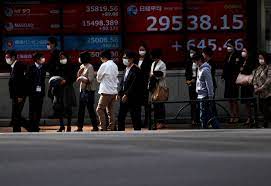Tokyo stocks end sharply lower on US, Europe rate hike fears | Busi Knews
Europe Rate Hike Fears
Source

Tokyo stocks ended sharply down Friday, with the Nikkei closing at a one-month low, following sell-offs in international markets overnight on fears over the adverse global economic impact of monetary tightening by U.S. and European central banks.
The yen briefly
plummeted against the U.S. dollar immediately after the Bank of Japan said it
had decided to keep its ultra-easy monetary policy intact at its policy
meeting, drawing a sharp contrast with global counterparts amid surging
inflation.
The 225-issue
Nikkei Stock Average ended down 468.20 points, or 1.77 percent, from Thursday
at 25,963.00, its lowest closing level since May 12. The broader Topix index
finished 31.91 points, or 1.71 percent, lower at 1,835.90.
On the top-tier
Prime Market, decliners were led by precision instrument, iron and steel, and
transportation equipment issues.
The foreign
exchange market was volatile, with the dollar trading near the 134 yen line in
the afternoon after climbing by around 1 yen from the lower 133 yen zone
following the BOJ policy meeting.
The Nikkei briefly tumbled 710 points, or 2.68 percent, in the morning a day after the Bank of England and Swiss National Bank announced interest rate increases in response to high inflation.
The benchmark
trimmed some losses in the afternoon, helped by the weakening yen and higher
U.S. stock futures, brokers said.
But investors
are wary about the possible negative effects of rate hikes, which lead to
higher borrowing costs for companies and households, after the latest rate hike
announcements followed the U.S. Federal Reserve's decision Wednesday to raise
its key interest rate by 0.75 percentage point, its largest increase since
1994.
"Market
participants are becoming more worried about recession rather than an economic
slowdown caused by aggressive monetary tightening," said Shingo Ide, chief
equity strategist at the NLI Research Institute.
"The
decision to raise rates by Switzerland's central bank and the BOE came as a
surprise, given that European economies have been undermined by the Ukraine
crisis," he said. "High inflation has become a global problem for
countries to tackle."
The BOJ, on the
other hand, maintained its ultraeasy monetary policy at its two-day policy
meeting through Friday, and reaffirmed its commitment to unlimited purchases of
10-year government bonds at a fixed rate of 0.25 percent every business day in
principle.
Among Prime
Market issues, declining issues outnumbered advancers 1,447 to 351, while 40
ended unchanged.
The Nikkei was
weighed down by the fall of heavyweight Tokyo Electron that dived 2,550 yen, or
5.0 percent, to 48,040 yen, tracking declines in U.S. counterparts as the
tech-heavy Nasdaq index plunged about 4 percent overnight.
Toyota Motor
lost 77.0 yen, or 3.6 percent, to 2,063.0 yen, after the carmaker said Thursday
it had slashed its global output plan for June due to difficulty in procuring
parts and a COVID-19 outbreak at one of its suppliers.
Trading volume
on the Prime Market rose to 1,869.65 million shares from Thursday's 1,130.69
million.



Comments
Post a Comment